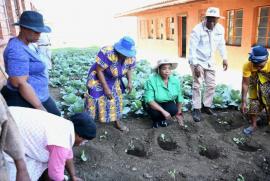
DURBAN (South Africa), May 3 (NNN-SANEWS) — In a groundbreaking initiative aimed at addressing food insecurity and uplifting township communities, KwaZulu-Natal Premier Nomusa Dube-Ncube has launched a programme aimed at equipping residents with the knowledge and resources necessary to cultivate healthy and nutritious crops in their neighbourhoods.
The Township Agriculture Programme aims to maximise food production in small spaces, promote a healthy ecosystem and increase biodiversity in urban areas.
Speaking at the event held at KwaMashu in the north of Durban, Dube-Ncube highlighted the programme’s dual purpose of combating hunger and fostering economic growth within township settings.
“With an innovative approach, the Township Agriculture Programme seeks to harness the untapped potential of urban spaces, promoting sustainable agricultural practices to maximise food production.
“Beyond merely providing sustenance, the initiative aims to cultivate a sense of community pride and self-sufficiency, empowering residents to take control of their food sources and contribute to the local economy,” Dube-Ncube said.
The Premier said township agriculture is a catalyst for social and economic empowerment, with a particular emphasis on supporting marginalised groups.
The program also aims to provide opportunities for women, youth, individuals with disabilities, and child-headed households to actively participate in agricultural activities, thereby promoting inclusivity and resilience within township communities.
To facilitate the implementation of township agricultural projects, government has allocated R6 million in funding, signalling its dedication to supporting grassroots initiatives.
“Plans are already underway to expand the Township Agriculture Programme to encompass major townships across KwaZulu-Natal, ensuring widespread access to resources and opportunities for all residents,” Dube-Ncube said.
During the launch, Dube-Ncube also led a Rabies Awareness Campaign, which saw the vaccination of pets against rabies.
The campaign emphasises responsible pet ownership to prevent unnecessary human deaths.
Since January 2023, the province has recorded 233 cases of rabies and seven human deaths.
“In total 17 people have died of rabies with the majority of the deaths occurring in eThekwini,” Dube-Ncube said.
The Premier urged community members to bring their pets for vaccination and inspection, emphasising the critical role of responsible pet ownership in safeguarding public health. — NNN-SANEWS




